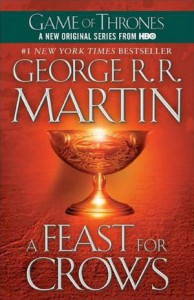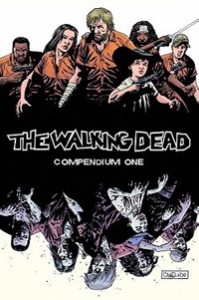
REVIEW: A Feast for Crows (A Song of Ice and Fire, #4)

It took me two years to finish this book from start to finish.
Two. Years.
In contrast, it took me about two weeks to finish (all of) Books 1-3 in George R. R. Martin's A Song of Ice and Fire series.
That alone should sum up my feelings for A Feast for Crows, but, lest I one day forget why I dislike this book so much and decide to give it another read-through, I'm going to put the issues I had with it into detail here.
For those of you that enjoy the ASoIaF series, like I do (did?), you may remember that A Storm of Swords ended with a bang.
Naturally, the main thing I wanted to know going into A Feast for Crows is, what's going to happen to Tyrion? And, being the fan-favorite character that he is, I'm sure I wasn't the only one.
So, what does Martin do? Write a book that contains absolutely no Tyrion. Zero. Nada. None. And, beyond that, it's also lacking chapters about other main characters, such as Jon Snow, Daenerys, and Bran. Somehow, Martin couldn't seem to fit these characters into the 1,000+ pages he produced, because he had to make room for a bunch of slog instead.
Essentially, in A Feast for Crows, you follow the stories of:
-Samwell Tarly (zzzzzzz…)
-Cersei Lannister (urge… to kill… rising…)
-Sansa Stark (aka Alayne, aka zzzzzzz...)
-Jaime Lannister
-Brienne of Tarth
-Arya Stark
-A bunch of people from the Iron Islands (zzzzzzz...)
-Some folks from Dorne (okay, I admit, I actually kind of enjoyed these chapters)
-Occasional other random people (zzzzzzz...)
In writing, there's something known as the "Iceberg Theory," in which the author only presents you with a glimpse of the world (s)he has created - this being the 1/8 of the iceberg that's above water - while there's a lot of story and world-building beneath the surface that the author knows, which is omitted from the reader.
I've come to appreciate the necessity of the Iceberg Theory after reading A Feast for Crows, in which Martin finds it necessary to substitute chapters about characters that we actually care for with chapters about everything else going on in Westeros. There's just so much stuff in this book that we really don't need to see first-hand. For example, are you curious about what's going on in the Iron Islands? No? Well, too bad, because instead of finding out what happened to Tyrion, you'll be getting a lot of krakenny antics shoved down your throat! Fun, right?
In addition to suffering through the entire iceberg of Westeros, you get chapters about total snooze-worthy characters, such as Sam Tarly and Sansa, as well as sooooooo many chapters from the point of view of Cersei. The Cersei chapters alternate between mind-numbingly boring small council discussions, to testing the reader's patience on just how much they can tolerate a loathsome character such as Cersei.
Then, when it came to the characters I actually do like (Arya, Jaime, and kind of Brienne), I honestly didn't find their chapters to be much more compelling. They just seemed so aimless. Really, for a 1,000+ page book, it seems that nothing interesting or significant happens until you get close to the very end.
The only thing that got me through this book was the urge to keep ahead of the HBO show, and encouragement from other ASoIaF fans, telling me that A Dance with Dragons (the next book in the series) gets the series back to its earlier glory. Spoiler alert:
If you can find a way to avoid this book (you can find out what happens on the HBO show, you can read the chapter summaries in the ASoIaF wiki, you can quit on the series altogether), then great. If you're going to force yourself to read it anyway… well, then, good luck. You're going to need it.
 3
3

 6
6











 <---------me
<---------me



















